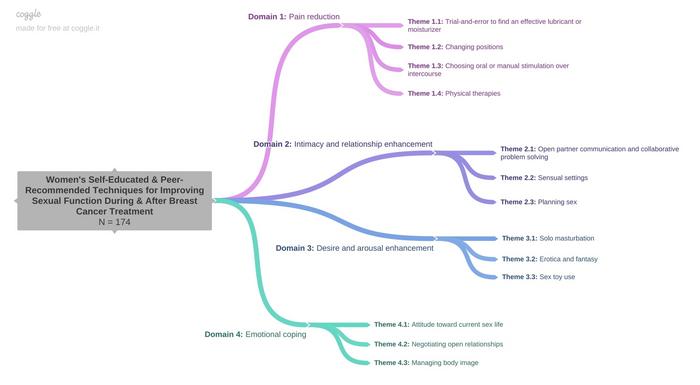A third of users on a popular breast cancer support forum describe using peer-recommended or self-discovered techniques to improve sexual functioning, according to a study published November 15, 2023 in the open-access journal PLOS ONE by Christiana von Hippel from the Dana-Farber Cancer Institute and Harvard T.H. Chan School of Public Health, USA, and colleagues.

Credit: Kate E. Dibble, created using Coggle (https://coggle.it/?lang=en-GB), CC-BY 4.0 (https://creativecommons.org/licenses/by/4.0/)
A third of users on a popular breast cancer support forum describe using peer-recommended or self-discovered techniques to improve sexual functioning, according to a study published November 15, 2023 in the open-access journal PLOS ONE by Christiana von Hippel from the Dana-Farber Cancer Institute and Harvard T.H. Chan School of Public Health, USA, and colleagues.
Over 75 percent of breast cancer survivors describe experiencing some degree of sexual dysfunction. Commonly prescribed interventions such as vaginal lubricants or numbing creams are only moderately effective, and many women report difficulty in discussing sexual dysfunction with their healthcare provider.
von Hippel and colleagues reached out to members of the popular Breastcancer.org online forum community who were women over 18 years old and diagnosed with Stage I-IV breast cancer. The study survey sought to quantify the frequency of sexual dysfunction in participants and investigate their techniques for improving sexual function.
501 women with a median age of 53 years completed the authors’ online survey. Participants were 70 percent sexually active at the time of survey completion, 69 percent heterosexual, 65 percent partnered, and 71 percent white (though about a quarter of participants provided no information regarding partner status, sexual orientation, or race/ethnicity). 47 percent reported being very or extremely satisfied with their sex lives prior to cancer treatment, and 44 percent reported having a significantly worsened sex life post-diagnosis. Though a quarter of participants reported discussing sexual function concerns with their providers, with vaginal dryness and pain with penetration the most common issues, the majority (57 percent) reported never discussing sexual side effects of breast cancer treatment with their clinicians. 35 percent of participants reported using techniques recommended by a peer or that they discovered themselves in order to improve sexual functioning. The authors found these techniques tended to fall into four main domains: pain reduction (e.g. using coconut oil for lubricant or choosing new positions); intimacy and relationship enhancement (e.g more open communication with partners); desire and arousal enhancement (e.g. solo masturbation or using erotica before partnered sex); and emotional coping (e.g. mindset shifts). 46 percent of participants rated their techniques as moderately or more effective when used in addition to or instead of standard techniques offered by clinicians.
Though the authors note their study may not be widely generalizable because of a lack of diversity in their sample, they encourage providers to initiate conversations around sex with their breast cancer patients and share coping techniques discussed by the participants here.
The authors add: “Women with breast cancer are taking the initiative to fill the gap in their care for sexual symptoms by seeking, innovating, and sharing solutions amongst themselves.”
#####
In your coverage please use this URL to provide access to the freely available article in PLOS ONE: https://journals.plos.org/plosone/article?id=10.1371/journal.pone.0293298
Citation: von Hippel C, Dibble KE, Rosenberg SM, Bollman-Jenkins M, Weiss M, Partridge AH (2023) Taking their wellbeing into their own hands: Self-educated and peer-recommended techniques used by women with breast cancer to improve sexual functioning during treatment and in survivorship. PLoS ONE 18(11): e0293298. https://doi.org/10.1371/journal.pone.0293298
Author Countries: USA
Funding: Dr. von Hippel was supported by the National Cancer Institute (NCI 3R25CA057711). Dr. Dibble was supported by the Helen Gurley Brown Foundation (Helen Gurley Brown Presidential Initiative) at Dana-Farber Cancer Institute and Harvard Medical School. Dr. Partridge receives support from Susan G. Komen and the Breast Cancer Research Foundation (BCRF). The funders had no role in study design, data collection and analysis, decision to publish, or preparation of the manuscript.
Journal
PLoS ONE
DOI
10.1371/journal.pone.0293298
Method of Research
Survey
Subject of Research
Not applicable
Article Title
Taking their wellbeing into their own hands: Self-educated and peer-recommended techniques used by women with breast cancer to improve sexual functioning during treatment and in survivorship
Article Publication Date
15-Nov-2023
COI Statement
Dr. Shoshana Rosenberg reports research funding from the Conquer Cancer Foundation. This does not alter our adherence to PLOS ONE policies on sharing data and materials. There are no restrictions on sharing of data and/or materials regarding the current study.



